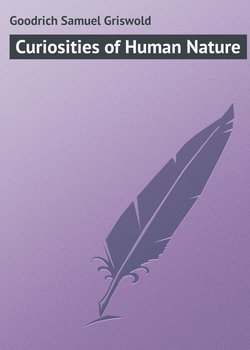Читать книгу Curiosities of Human Nature - Goodrich Samuel Griswold - Страница 11
JEDEDIAH BUXTON
ОглавлениеThis extraordinary man was born in 1705, at Elmeton, in Derbyshire. His father was a schoolmaster; and yet, from some strange neglect, Jedediah was never taught either to read or write. So great, however, were his natural talents for calculation, that he became remarkable for his knowledge of the relative proportions of numbers, their powers and progressive denominations. To these objects he applied all the powers of his mind, and his attention was so constantly rivetted upon them, that he was often totally abstracted from external objects. Even when he did notice them, it was only with respect to their numbers. If any space of time happened to be mentioned before him, he would presently inform the company that it contained so many minutes; and if any distance, he would assign the number of hair-breadths in it, even though no question were asked him.
Being, on one occasion, required to multiply 456 by 378, he gave the product by mental arithmetic, as soon as a person in company had completed it in the common way. Being requested to work it audibly, that his method might be known, he first multiplied 456 by 5, which produced 2,280; this he again multiplied by 20, and found the product 45,600, which was the multiplicand, multiplied by 100. This product he again multiplied by 3, which gave 136,800, the product of the multiplicand by 300. It remained, therefore, to multiply this by 78, which he effected by multiplying 2,280, or the product of the multiplicand, multiplied by 5, by 15, as 5 times 15 is 75. This product being 34,200, he added to 136,800, which gave 171,000, being the amount of 375 times 456. To complete his operation, therefore, he multiplied 456 by 3, which produced 1,368, and this being added to 171,000, yielded 172,368, as the product of 456 multiplied by 378.
From these particulars, it appears that Jedediah's method of calculation was entirely his own, and that he was so little acquainted with the common rules of arithmetic, as to multiply first by 5, and the product by 20, to find the amount when multiplied by 100, which the addition of two ciphers to the multiplicand would have given at once.
A person who had heard of these efforts of memory, once meeting with him accidentally, proposed the following question, in order to try his calculating powers. If a field be 423 yards long, and 383 broad, what is the area? After the figures were read to him distinctly, he gave the true product, 162,009 yards, in the space of two minutes; for the proposer observed by the watch, how long it took him. The same person asked how many acres the said field measured; and in eleven minutes, he replied, 33 acres, 1 rood, 35 perches, 20 yards and a quarter. He was then asked how many barley-corns would reach eight miles. In a minute and a half, he answered 1,520,640. The next question was: supposing the distance between London and York to be 204 miles, how many times will a coach-wheel turn round in that space, allowing the circumference of that wheel to be six yards. In thirteen minutes, he answered, 59,840 times.
On another occasion a person proposed to him this question: in a body, the three sides of which are 23,145,789 yards, 5,642,732 yards, and 54,965 yards, how many cubic eighths of an inch? In about five hours Jedediah had accurately solved this intricate problem, though in the midst of business, and surrounded by more than a hundred laborers.
Next to figures, the only objects of Jedediah's curiosity were the king and royal family. So strong was his desire to see them, that in the beginning of the spring of 1754, he walked up to London for that purpose, but returned disappointed, as his majesty had removed to Kensington just as he arrived in town. He was, however, introduced to the Royal Society, whom he called the Folk of the Siety Court. The gentlemen present asked him several questions in arithmetic to try his abilities, and dismissed him with a handsome present.
During his residence in the metropolis, he was taken to see the tragedy of King Richard the Third, performed at Drury Lane, Garrick being one of the actors. It was expected that the novelty of everything in that place, together with the splendor of the surrounding objects, would have filled him with astonishment; or that his passions would have been roused in some degree, by the action of the performers, even though he might not fully comprehend the dialogue. This, certainly, was a rational idea; but his thoughts were far otherwise employed. During the dances, his attention was engaged in reckoning the number of steps; after a fine piece of music, he declared that the innumerable sounds produced by the instruments perplexed him beyond measure, but he counted the words uttered by Mr. Garrick, in the whole course of the entertainment; and declared that in this part of the business, he had perfectly succeeded.
Heir to no fortune, and educated to no particular profession, Jedediah Buxton supported himself by the labor of his hands. His talents, had they been properly cultivated, might have qualified him for acting a distinguished part on the theatre of life; he, nevertheless, pursued the "noiseless tenor of his way," content if he could satisfy the wants of nature, and procure a daily subsistence for himself and family. He was married and had several children. He died in the year 1775, aged seventy years. Though a man of wonderful powers of arithmetical calculation, and generally regarded as a prodigy in his way – it is still obvious that, after the practice of years, he was incapable of solving questions, which Zerah Colburn, at the age of six or seven years, answered in the space of a few seconds.
